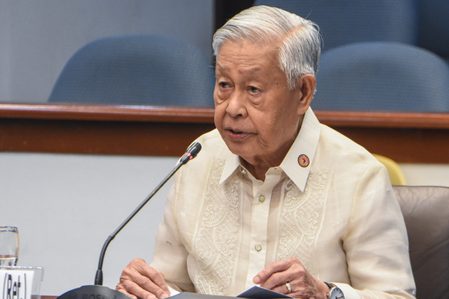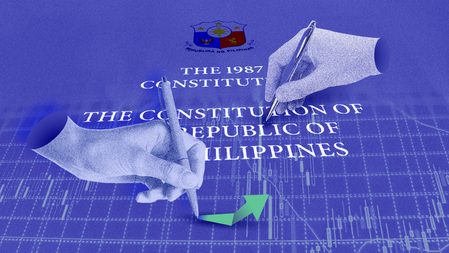Joseph Nathan Cruz

'This is about the struggle for power between those who want more authentic representation and those who want to consolidate even more power in more effective ways under a new system'
I mean this both in the sense that this essay really isn’t about charter change, and in the sense that the current tug-of-war between certain political sectors on the issue of amending the Constitution is really just a screen for other struggles concerning other issues.
Part of the reason that it’s difficult to decide on who is right and who is wrong is that both camps are not exactly speaking the same language. For instance, while those against charter change employ a rhetoric of political suspicion, those who are campaigning for charter change see in it a kind of economic panacea to the ills of our society. From this perspective, the reason for our inability to solve our social problems are problematic constitutional restrictions repelling foreign domestic investments and stunting our country’s economic growth, which can be fixed if we revise the Constitution.
Contingency, power, and charter change
Of course, this assumes that it can be 100% scientifically demonstrated that a less protectionist Constitution would be so much better for our country. Unfortunately, economics is not hard science, unlike physics or chemistry. Even with all the math, economics represents humanity’s attempt to make orderly models out of a chaotic reality influenced by dozens, if not hundreds, of factors.
But if, for the sake of argument, we assume to be factual the assertion that charter change will fix the economy, then it would indeed make charter change an attractive proposition. Logically, we cannot achieve certain targets no matter how hard we work if the structures that frame our efforts are ineffective and inefficient.
Other Stories
Eager to start charter change discussions, House lawmakers file RBH7
RBH7 is almost an exact copy of the Senate’s RBH6, proposing amendments only to specific economic provisions
FACT CHECK: Senators not the only Filipinos eligible to run for President, VP
Contrary to the claim, the Constitution does not require anyone to have prior senatorial experience before running for office
House panel votes yes to charter change via constitutional convention
(1st UPDATE) Committee chairman Rufus Rodriguez clarifies that the resolution approved is a 'general statement' of the panel, and that lawmakers will still have to pass an accompanying bill on charter change
This is not new rhetoric. Our country’s socialist Left has always argued this – that reforms are meaningless within a failed structure – and this has been the driving force behind its protracted people’s war, its dream of revolution. I can’t say whether or not our politicos are aware of it, but they share the same language with the communists they routinely take shots at. It is a messianic rhetoric that pegs a utopian ideal on a central idea, whether the revolution or charter change. And because of this, they share the same weakness – a lack of sufficient respect for historical contingency.
By this, I mean that their rhetoric is fundamentally based on a view that reduces history to a single, logical chain and assumes that one crucial thing can lead to another – in this case that changing the charter will lead to social progress.
But history isn’t always logical. Logical prophecies routinely go wrong. This is because logic can only be truly, 100% effective when it has access to all relevant factors. The success of prophecy is proportionate to the extent of the prophet’s grasp of relevant information. Unfortunately, history is too large – involving too many actors and factors, being too contingent – for one person or group of persons to have a complete understanding of the big historical picture.
People pessimistic about revolution usually ask, “After the revolution, what then?” People too optimistic about charter change should ask themselves the same question, since their rhetoric is bordering on promising some kind of utopia, as if charter change by itself can solve all our woes.
The anti-charter change groups recognize this. They say this isn’t the best time to be messing around with the Constitution. They point to the fact that removing economic restrictions from the Constitution would not actually accomplish much if the administration continues to fail in fixing all the other challenges that make the Philippines unattractive as a destination for foreign direct investments. These challenges include problems relating to infrastructure, governance, corruption, and ease of doing business.
However, I don’t think that this is an effective argument. It leads to the usual form-vs-content debate which quickly deteriorates into a chicken-or-egg question. For example, the question of whether charter change will lead to more economic capacity to improve infrastructure and governance, or whether improving our people’s culture of governance first would make changes to the Constitution economically meaningful. Such questions are a waste of time.
Must Read
Why 1987 Constitution framer Hilario Davide Jr. opposes charter change

Structures influence people and people also influence structure. The relationship is dialogical, and the extent of their influence on each other is contingent on many other factors. We need both a good economic structure as well as a good culture that produces good people to fill these structures. So if we take seriously the argument that our problem is structural and that charter change can help solve that problem, then the right time to deal with it is not now or tomorrow, but yesterday. If charter change can bring about much-needed structural reforms, so be it.
Of course, that’s a big “if.” And the reason for my observation that the contending camps are not speaking the same language is that while charter change proponents choose to focus on structural, economic issues, their opponents are more concerned about another issue altogether, the issue of power. While the former see charter change as a cure, the latter see it as something that can make things worse. For if we were to all hypothetically agree that the charter needs to be changed, the question becomes: who will decide on these changes and whose interests will these changes serve?
This is the reason why charter change debates in previous administrations featured fierce arguments on how these changes were to come about. One option was for Congress to designate and organize itself as a constitutional assembly. But Congress had been revealed in past decades to be a circus, and respected senators and congressmen were exposed as either incompetents, clowns, or both. Their credibility to represent the people’s interests has become suspect. It is for this reason that some groups advocate the formation of a constitutional convention, which they thought would be more democratic, but even then, the process remains suspect when one cannot fully trust those who appoint or choose members of the convention.
Must Read
[In This Economy] Stop using the PH economy as excuse for charter change

Given this background, it becomes easy to read why some groups have instead pushed for a “people’s initiative.” A people’s initiative organized at the barangay level using government resources makes for a process of constitutional change that is easier implement – and also easier for some politicians to hijack.
And there lies the rub: this is about the struggle for power between those who want more authentic representation and those who want to consolidate even more power in more effective ways under a new system.
In other words, while Cha-Cha proponents engage in a messianic rhetoric that promises social progress as a result of charter change, their opponents are seeing that this project for saving the national economy can easily be hijacked by ill-intentioned, powerful individuals who will not hesitate to find ways to piggyback their selfish interests on the shoulders of charter change.
Perhaps, the political climate can change sooner or later so that the charter change process can be initiated with more credibility and in a manner that is truly more democratic. But for now, we cannot help but subject charter change to a realistic apprehension of historical contingency, knowing that the future is in our hands but not totally. The imminent debate on charter change is not a case of a unified, monolithic national body deciding what is best for itself, but a case of fragmented interest groups rallying to consolidate their power over other people and to shape the charter in order to legitimize their will-to-power. That’s what this is about.
And that’s why this is not about charter change. – Rappler.com
Formerly an Assistant Professor in De La Salle University’s Behavioral Sciences Department, Joseph Nathan Cruz has a master’s degree in sociology from the National University of Singapore where he graduated in 2011. He currently works as head of quality management for a savings and loans cooperative.
The views expressed by the writer are his/her own and do not reflect the views or positions of Rappler.
Source: https://www.rappler.com/voices/imho/opinion-this-is-not-about-charter-change/
Comments
Post a Comment